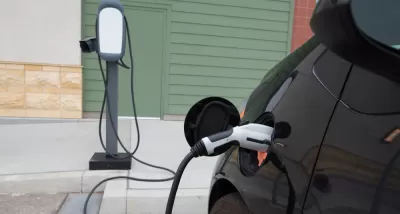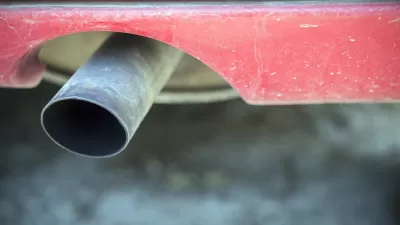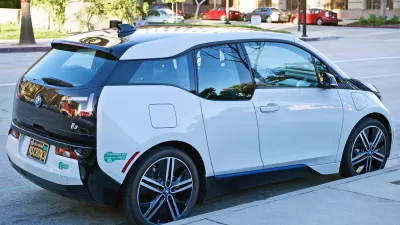A report from the Global Climate Action Summit on a looming deadline set by the Paris climate agreement: ending sales of new gas and diesel-powered light-duty vehicles by 2035.

"Transportation is the most vexing problem the summit will confront," reported Evan Halper for the Los Angeles Times on Sept. 11, the day before the 3-day Global Climate Action Summit began in San Francisco. Reducing emissions from driving is more complex than reducing emissions from electricity generation, as one energy expert cited in the article observed.
The political leaders coming from around the world for Gov. Jerry Brown’s climate action summit this week will grapple with a lot of urgent deadlines to drive down emissions, but one date is especially exasperating. It is 2035 — the year advocates aim to kill off production of gasoline- and diesel-powered vehicles.
Internal combustion engine cars need to be off the roads altogether by 2050 to meet the Paris goals. Dealers would need to stop selling new models 15 years earlier.
That will be a heavy lift, according to Peter Tertzakian, executive director of the Arc Energy Research Institute, a Canadian group that analyzes energy investments.
The idea that the internal-combustion engine can be phased out in the next 20 years without government intervention on a massive scale and an unprecedented social awakening among the driving public is foolish, said Tertzakian.
He said most leaders assume the average driver will embrace electric as technology improves, much as parts of the power industry gave up fossil fuels as better systems emerged. But giving up gas-powered cars requires complex shifts in the way people live that don’t come into play when a coal power plant is replaced with a solar or gas plant.
“The Paris agreement was signed three years ago,” Tertzakian said. “The years keep passing, and the substitution [of gas-powered vehicles] is not happening. Look at oil and gas use. It is not decelerating. It is accelerating.”
A new academic study and an updated survey on achieving phase-outs or bans on the sales of new internal combustion engine passenger vehicles by a date certain were released at the conference:
- 100% Zero: Solutions to Achieve Universal Zero-Emission Vehicle Adoption, by Ethan Elkind, Director of the Climate Program, Center for Law, Energy & the Environment at UC Berkeley Law, and Ted Lamm, Research Fellow in the Climate Program.
- A Survey on Global Activity to Phase Out Internal Combustion Engine Vehicles [pdf], by Isabella Burch, Center for Climate Protection, Santa Rosa, Calif.
Halper illustrates the aforementioned point made by Tertzakian of Arc Energy Research Institute, that "massive government intervention" is a requirement to achieve a phase-out:
The shift toward electric vehicles in parts of Europe and Asia is bolstered by government subsidies and tax structures that few American politicians would consider. They include tough gas-guzzler penalties for those who drive high-horsepower, climate-unfriendly pickups and SUVs, and large cash grants and tax breaks for those who buy electric.
One example of such a policy, not by a nation but by cities, was cited by Yunshi Wang, director of the China Center for Energy and Transportation of the UC Davis Institute of Transportation Studies during a panel discussion, "Gasoline/Diesel Car Phaseouts: New Global Strategy To End Petroleum Use" organized by Coltura and the Sierra Club.
Chinese cities limit the number of cars by restricting access to license plates, unlike most Western countries. Beijing reduced the quota for licenses of cars with internal combustion engines by a third in 2015, resulting "in around 2,000 applicants for every new car that uses diesel or petrol," reported Echo Huang on June 11 for Quartz. A lottery system selects the winners.
By contrast, EV licenses are available on a first come – first served basis, and applications have surged.
Nearly 290,000 applicants (link in Chinese) in Beijing are waiting to get a car plate for “new energy vehicles,” which in China includes EVs and plug-in hybrids, according to data the Beijing Municipal Commission of Transport put out on Saturday (June 9). But the city only has a quota of 54,000 (link in Chinese) for this year. Some might have to wait five years to get a plate, according to local news outlet Beijing Youth Daily.
However, Chinese vehicle buyers still want to purchase gas-guzzling SUVs, notes an earlier article in Phys.org, which emphasizes the need for regulations and market incentives to shift demand.
Additional posts on the historic summit:
-
A three-day global summit on climate action in San Francisco, hosted by Gov. Jerry Brown, is unlike other international climate summits in that it features "non-state actors," such as governors, mayors, and businesses, rather than nations.
-
Keep it in the Ground – 2018, Sept. 10As climate hawks gather in San Francisco for the Global Climate Action Summit that convenes Wednesday, Gov. Jerry Brown, host of the summit, is dogged by critics who can't distinguish between oil production and consumption.
FULL STORY: At Jerry Brown's climate summit, one deadline will overshadow all the others

Planetizen Federal Action Tracker
A weekly monitor of how Trump’s orders and actions are impacting planners and planning in America.

Congressman Proposes Bill to Rename DC Metro “Trump Train”
The Make Autorail Great Again Act would withhold federal funding to the system until the Washington Metropolitan Area Transit Authority (WMATA), rebrands as the Washington Metropolitan Authority for Greater Access (WMAGA).

The Simple Legislative Tool Transforming Vacant Downtowns
In California, Michigan and Georgia, an easy win is bringing dollars — and delight — back to city centers.

The States Losing Rural Delivery Rooms at an Alarming Pace
In some states, as few as 9% of rural hospitals still deliver babies. As a result, rising pre-term births, no adequate pre-term care and "harrowing" close calls are a growing reality.

The Small South Asian Republic Going all in on EVs
Thanks to one simple policy change less than five years ago, 65% of new cars in this Himalayan country are now electric.

DC Backpedals on Bike Lane Protection, Swaps Barriers for Paint
Citing aesthetic concerns, the city is removing the concrete barriers and flexposts that once separated Arizona Avenue cyclists from motor vehicles.
Urban Design for Planners 1: Software Tools
This six-course series explores essential urban design concepts using open source software and equips planners with the tools they need to participate fully in the urban design process.
Planning for Universal Design
Learn the tools for implementing Universal Design in planning regulations.
Smith Gee Studio
City of Charlotte
City of Camden Redevelopment Agency
City of Astoria
Transportation Research & Education Center (TREC) at Portland State University
US High Speed Rail Association
City of Camden Redevelopment Agency
Municipality of Princeton (NJ)





























